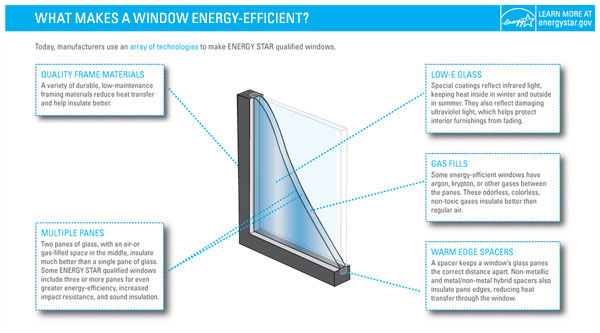Speak to an Expert | 970-593-1500
What Are The Most Energy Efficient Windows?
When you are looking for ways to make your home more energy-efficient, it is important to research what are the most energy efficient windows on the market.
There are many different window replacement styles available, so it can be tricky to know which ones are the most energy-efficient.
Let’s take a look at the key factors concerning energy efficiency and the different types of windows so you can better understand what to look for to find what’s best for your home.
What Is Energy Efficient Glass?
Energy-efficient glass is a type of glass that is designed to reduce the amount of energy required to heat or cool a building. This can be accomplished in several ways by using low-emissivity coatings that reflect heat back into the building, or by using argon gas fillers to reduce heat transfer.
In addition, energy-efficient glass can also be used in conjunction with energy-efficient windows and doors to further reduce energy consumption. Like awning windows, they generally have lower air leakage rates than sliding windows because the sash closes by pressing against the frame.
By taking advantage of these energy-saving technologies, buildings can significantly reduce their energy costs and help to protect the environment.
Energy Efficiency Ratings
There are a few things that you need to understand about energy efficiency ratings and windows.
A well-installed window is a key to keeping your home airtight and insulated. Poor installation can lead to air infiltration, which can increase your heating and cooling costs.
Energy-efficient windows will have a low U-factor. This measures the amount of heat that escapes through a window. A window with a lower U-factor is better at insulating your home.
Windows that are energy efficient will have a low solar heat gain coefficient. This measures how much heat from the sun is transmitted through the window. A lower solar heat gain coefficient means less heat will enter your home.
The U-factor and SHGC that you select for each window should be dependent on the direction the window faces.
The most energy-efficient windows have multiple panes of glass. This prevents drafts and further improves insulation. There will be some type of gas in between the panes of glass to further improve insulation.
Be sure that the window company you buy from uses ENERGY STAR rated windows. These labels will show what climate zone they are suitable for.
What Is The Most Efficient Glass For Windows?
Windows are one of the most important energy-efficient features in a home. They let in sunlight and help to regulate the temperature inside the house. But not all windows are created equal.
Two of the most energy-efficient glass types for windows are double-glazed and low-emissivity glass.
Low-E Glass
Low-Emissivity or Low-E window glass is coated with a special film that helps to reflect heat back into the room. It also blocks out UV rays, which can fade furniture and carpeting over time.
Low-E glass is also energy efficient because it doesn’t allow heat to escape from the house in the winter or enter the house in the summer. As a result, it can help to keep your energy bills down all year long.
Low-E windows are a great choice for homes that get very hot, as they reflect heat back out and keep your home cooler. However, in regions with cold winters, Low-E windows can actually make your heating bills increase. That’s because, on those freezing days, the little sunlight that does shine through doesn’t provide any warmth.
Double-Glazed Window Or Insulating Glass Unit (IGU)
A double-glazed window, also known as an insulating glass unit (IGU) has two panes of glass separated by a layer of air or gas.
If you live in a colder climate, double glazing can help to keep your home warm in the winter by trapping heat from the sun within your home. In the summer, the cool air will stay inside to help regulate the temperature.
And if your area is particularly noisy, double glazing can also help to reduce any unwanted noise pollution. So if you’re looking for a way to improve the comfort of your home, double glazed windows may be the perfect solution.
Be sure to consult with a qualified window specialist to find the best option for your needs
What Windows Have The Highest R-Value?
In the construction and building industry, R-value is used to measure thermal resistance. A material’s thermal resistance determines how well it resists heat flow. A window with a higher R-value is better at insulating against heat loss.
A high R-value is characteristic of energy-efficient windows. Windows with high R values include double-glazed windows, triple-glazed windows, and argon-filled windows.
Double-glazed windows have two layers of glass with a space in between, while triple-glazed windows have three layers of glass. Argon-filled windows also have two or three layers of glass, but the space between the panes is filled with argon gas.
Which Type Of Window Has The Highest Heat Loss?
When it comes to window types, there are a few different factors that come into play in terms of heat loss.
Single-pane windows are the least energy-efficient because they don’t have the same insulating properties as double- or triple-pane windows.
In addition, windows with metal frames tend to be less energy efficient than those with wood or vinyl frames. The type of glass also makes a difference – clear glass conducts heat more efficiently than tinted or coated glass.
Finally, window orientation also affects heat loss – south-facing windows will lose more heat than north-facing windows. Ultimately, the best way to reduce heat loss is to choose energy-efficient window materials and designs.
How Much More Energy Efficient Are Double-Pane Windows?
Double-pane windows are a window type that consists of two panes of glass separated by a spacer. The spacer is typically filled with argon gas, which reduces heat transfer.
Double pane windows are more energy-efficient than single-pane windows because they help to keep heat in during the winter and out during the summer.
As a result, they will save you money on your energy bills. In fact, they can save you up to 30% on your heating and cooling costs. They are more durable than single-pane windows and they provide better soundproofing. This means that double-pane windows are a great choice for any home.
Do Triple-Pane Windows Save Energy?
Triple-pane windows are three panes of glass with a layer of insulating gas between each pane. They are also considered more energy-efficient than double-pane windows because they provide better insulation.
On a cold winter day, triple-pane windows can help to keep your home warm by trapping heat inside. Similarly, in the summertime, they help keep your home cool by blocking out the sun’s rays.
In addition, triple-pane windows are less likely to develop condensation than single-pane windows, making them an ideal choice for moist or humid climates.
Triple-pane windows can save you money on your utility bill, but they usually cost more upfront. In general, windows with triple-panes are most effective in extreme climates that experience frigid winters or sweltering summers.
If you live in a moderate climate, triple-pane windows may not be worth the extra cost. Ultimately, the best way to determine if triple-pane windows are right for you is to consult with a qualified window consultant.
What Is The R-Value Of Glass Windows?
A material’s R-value measures how well it resists heat transfer. A higher R-value means better insulation. The R-value of glass windows is determined by the type of glass and the number of panes.
For example, a single pane of glass has an R-value of about 1.0, while a double pane window has an R-value of about 2.5.
In general, the thicker the glass, the higher the R-value. However, other factors such as airtightness and surface reflectivity also play a role in insulating capacity. As a result, R-values should be considered along with other factors when choosing windows for your home.
What Type Of Window Style Is Most Energy Efficient?
The most energy-efficient window style is the double-hung window. Double-hung windows are designed to let in plenty of natural light while still keeping your home well insulated.
They are also easy to operate and can be opened from both the top and bottom, which allows you to control the amount of ventilation in your home.
How Do I Choose Energy Efficient Windows?
The best window replacement companies will help you find the best energy-efficient windows for your home. If you want to start saving money by reducing your energy bills to keep your home more comfortable all year long, you want to find a company that knows what will be best for your particular home design, its location, and the climate.
A good window replacement company will walk you through each step and help you find the best energy-efficient windows for your home.


